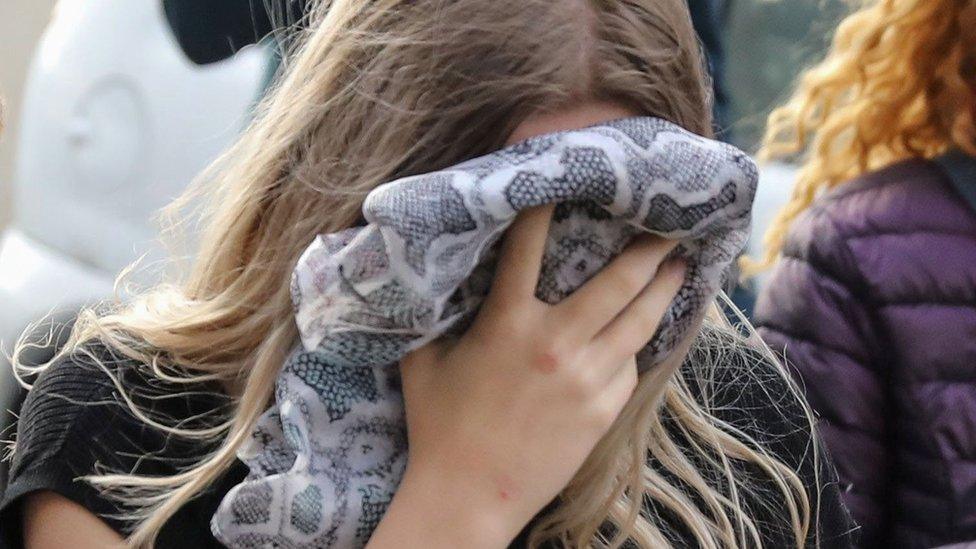Ayia Napa rape case: Teenager's mother promises 'relentless pursuit of justice'
- Published

The woman covered her face as she arrived at court in January
The mother of a British woman found guilty of lying about being gang-raped in Cyprus has told the BBC they will be "relentless in the pursuit of justice", as they appeal against her conviction.
The teenager was given a four-month sentence, suspended for three years.
Her lawyer said he "expected a full hearing before the [Cypriot] Supreme Court" from May onwards.
He said her initial statement admitting guilt had been taken "in breach of both EU and European Human Rights Law".
'Pressure and coercion'
Speaking to the BBC's Victoria Derbyshire programme, the woman's mother said: "The issues in this case are of such monumental importance for sexually assaulted women around the world that we will be relentless in the pursuit of justice."
She added that her daughter was "doing well and has blended back into society" since she returned to the UK after being handed her sentence in January.
The woman - whom the BBC is not naming - was put on trial and convicted in December after recanting a claim that she had been raped by a group of 12 young men in a hotel room in Ayia Napa in July 2019.
She said Cypriot police had made her falsely confess to lying about the incident - something police have denied.
Her lawyer, Lewis Power QC, told the Victoria Derbyshire programme "the fight to clear her name forges ahead in earnest".
"She maintains that she was brutally raped but was forced to change her account under pressure and coercion from the Cypriot Police."
He said her "confession" had been taken "without access to a lawyer" and "under immense pressure" after hours of questioning.
"We will also be highlighting a number of key issues such as the District Court's refusal to hear evidence which supported the teenager's account, and also the very conduct of the trial and the arguable differential treatment between the defence and the prosecution.
"Additionally, the court's apparent disregarding of the array of expert evidence put forward by the defence was a surprising feature of this case, and we hope that when the appeal court views this case as a whole they will come to the view that the young girl was not afforded a fair trial."
Shami Chakrabarti, Labour's Shadow Attorney General, told the BBC: "This shocking case raises many unanswered questions of both Cyprus and UK governments.
"Did the Cypriot police contact the British High Commission before the young woman was questioned or pressured about her complaint for eight hours? Was she offered any consular support? If not, why not?"
'A second chance'
During the sentencing in January, judge Michalis Papathanasiou told the teenager he was giving her a "second chance" by suspending her sentence - allowing her to fly back to the UK.
He said the woman's "psychological state, her youth, that she has been away from her family, her friends and academic studies this year", had led him to the decision.
At the time, Boris Johnson's spokesman said the UK prime minister was "pleased" she could now return home.
However, Downing Street said the UK government had highlighted its "concerns about the judicial process in this case and the woman's right to a fair trial" to the Cypriot authorities.
The 12 men whom the woman alleges raped her were arrested but later freed, and returned home after she retracted her claims.
Israeli lawyer Nir Islovich, who represented four of the 12 men in the case, welcomed the decision to convict the woman.
"What was important to us was that she would be convicted of the charges brought against her," he said at the time.
"That happened with full adoption of the facts as presented by my clients."

Follow the BBC's Victoria Derbyshire programme on Facebook, external and Twitter, external - and see more of its stories here.
- Published8 January 2020
